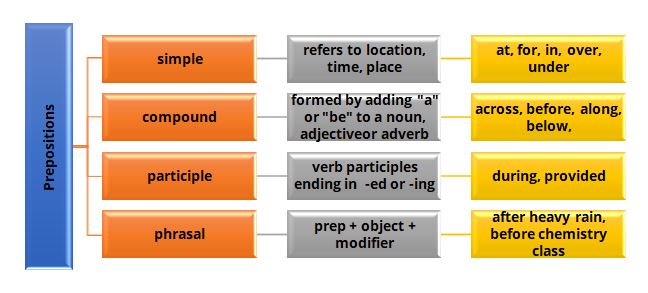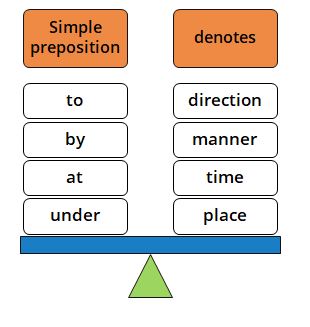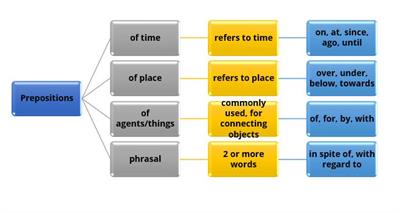
PUMPA - SMART LEARNING
எங்கள் ஆசிரியர்களுடன் 1-ஆன்-1 ஆலோசனை நேரத்தைப் பெறுங்கள். டாப்பர் ஆவதற்கு நாங்கள் பயிற்சி அளிப்போம்
Book Free DemoA preposition is a linking word, that is placed before a noun (or a pronoun) and establishes the positional relationship with other words in the sentence.
In simpler words, a preposition is a connecting word, that links the noun/pronoun with the verb/adjective in the sentence.
Example:
She is sitting on a chair.
She - pronoun
Sitting - verb
On - preposition
Chair - noun
The preposition (on) connects the pronoun, verb and the noun.
Important!
Prepositions, as the name suggests, usually denote the position of the subject in the sentence.
Take a look at the following:
1. It usually rains in September.
2. I usually sleep early at night.
3. Since 2015, I have stopped eating sugar.
4. Before 2004, there were many problems in our society.
5. I'm on leave till 24th of this month.
The emphasized words establishes a connection between the noun and the other words in the sentence.
Prepositions are of different types. Let us look into each type in detail:

Simple prepositions: It is used to establish the connection between noun and other words by denoting time, location or place.
Example:
1. I should be there at 4 pm.
2. Sheela has kept milk in the fridge.
3. There is a cat under the bench.
Here is a list of commonly used simple prepositions:
| at | in | by |
| under | over | on |
| beside | to | for |
| over | through | across |
| with | since | off |
| above | near | from |
The following can help you to remember basic prepositions easily:

Example:
1. He was going to school.
2. She was explaining the art by using pictures.
3. I have to be in school at 7'o clock sharp.
4. Maya was sitting under the mango tree.
Compound prepositions: These are generally formed by prefixing a preposition to a noun or an adjective or an adverb. Commonly used letters are "a" or "be"
Some of the compound prepositions are:
| about | above | below |
| along | across | amidst |
| around | before | behind |
| beside | between | beneath |
Others include inside, outside, underneath, within, without etc.
Example:
The kids were jumping about in the play area.
There was a note beside the telephone for Ram.
The tides rose above the usual heights.
Participle prepositions: Some words which are participles of verbs are used without any noun or pronoun attached to it. These prepositions end in -ed or -ing.
Example:
1. This noise is concerning many households.
2. There was a huge protest following yesterday's announcement.
3. They agreed to the arrangement, provided we gave it in writing.
4. Excluding these two kids, all of them were involved in the play.
Here is a list of some participle prepositions:
| barring | concerning | considering |
| during | notwithstanding | pending |
| regarding | respecting | provided |
Phrasal prepositions: It consists of a preposition + another word + a modifier to the word.
Example:
According to reliable sources, there was no evidence of theft.
For the sake of clarity, we can use pictures to describe the theory.
All the kids assembled in front of the chemistry class.
Here is a list of common phrasal prepositions:
| according to | in place of | with reference to |
| by means of | in spite of | in front of |
| for the sake of | with a view to | owing to |
| in lieu of | with regard to | instead of |
Prepositions can be classified on the basis of its functionality. The prepositions used are the same in both types of classifications.

Prepositions of time refers to prepositions that tell about the time of the occurrence of a particular event. It includes on, at, since, ago, until, for, during etc.
Example:
1. I was waiting for my teacher.
2. Suresh will be there at 9 am.
3. My friend is leaving for Delhi on 21st.
4. Helen drew this sketch during her holidays.
Prepositions of place refers to prepositions that describe about the location. It includes in, on, over, below, near, under, above etc.
Example:
1. The bag was under the bed.
2. Sheela lives near the school.
3. There was an insect above my head.
4. There are chocolates in the box.
Prepositions of movement refers to prepositions that describe the direction or movement. It includes into, through, towards etc.
Example:
1. I went towards the dog that was barking at me.
2. The box slid into the bag perfectly.
3. You should walk through the market to reach my house.
Phrasal prepositions are prepositions with two or more words. It includes in spite of, with regard to etc.
Example:
1. In spite of repeating many times, you are doing the same mistake.
2. With regard to your question about salary, we have to discuss more.
3. Instead of working hard, try to work smart.
4. Ram is good in English as well as Maths.
List of prepositions from the lesson "Learning the Game":
- I played tennis-ball cricket with my colony friends
- I loved watching cricket on television
- I often tried to emulate the mannerisms of my favourite players
- Anyone could come for a trial at the camp
- He started playing cricket at the age of eleven in 1943
- I had never batted in the nets before
- My induction into the Mumbai cricket circuit could have ended in failure
- I would practice between 7.30 am and 10.30 am in the morning
- I would be exhausted by the end of the day
- While doing so, Sir should pretend to go away and then watch from a distance
- Ajit was in the room with my father at the time
- During the break, Sir would often give me some money to go and have a vadapav
- While this demand was unreasonable, I did not realize that my parents also had to take care of the needs of the family
- Though I loved cricket, there were still occasional days when I sneaked out